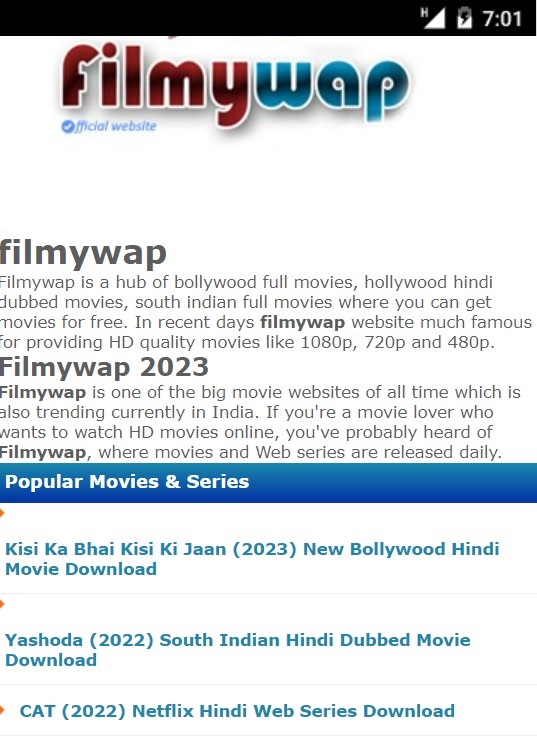Filmywap 2025: Risks & Alternatives To Watch Movies Safely
In an era dominated by streaming services and on-demand entertainment, how can we navigate the murky waters of online movie piracy and ensure a safe, legal, and enjoyable viewing experience?
The digital landscape has become a vast and often confusing space for movie enthusiasts. On one hand, we have legitimate platforms offering an ever-expanding library of content. On the other, we find ourselves confronted by websites like Filmywap, a name that frequently surfaces in discussions about free movie downloads. But the promise of instant access to the latest Bollywood, Hollywood, and regional films for free comes with a hefty price, one that extends far beyond financial concerns. While websites like Filmywap may seem appealing, their activities raise serious ethical and legal questions. They often operate in the grey areas of copyright law, providing access to pirated content that harms the film industry and poses significant risks to those who use their services. Its a scenario that begs us to reconsider how we consume media and what we are willing to risk for convenience.
Let us examine a more detailed view of the issue, looking at the history of online piracy, examining the risks involved, and exploring the safer, legal streaming alternatives available to us. We'll aim to provide an informed perspective, helping readers make smart choices in the face of this ongoing digital dilemma. It's about ensuring that our entertainment choices align with both personal safety and the integrity of the film industry.
- Kyla Yesenosky Onlyfans Leaks Privacy And Controversy
- Eric Lara Trump Net Worth 2024 How Wealthy Are They
Websites like Filmywap, which often pop up with different domain names, such as "Filmy4wep 2025" or "Filmy4wap 2025," are not just simple search results. They are part of a complex network of piracy. These websites provide access to a variety of films, including Bollywood, Hollywood, Punjabi, Tamil, Telugu, and Kannada movies, often in high-definition quality. The allure of free, readily available content is undeniable, drawing in many users. Yet, this access comes at a cost, and not just to the film industry. The legal, security, and ethical implications of using such platforms are significant.
The core issue stems from the illegal distribution of copyrighted material. Websites like Filmywap operate by hosting or linking to pirated copies of movies, often without the permission of the filmmakers, distributors, or copyright holders. This violates copyright laws and deprives the creators of their due compensation. The entertainment industry invests vast sums of money in the production, marketing, and distribution of movies. When these films are illegally distributed, the industry loses revenue, affecting the viability of future projects and the livelihoods of countless people involved in the film-making process.
Moreover, using websites that offer pirated content exposes users to significant risks. These sites are often riddled with malware, viruses, and other malicious software. When users download movies from these platforms, they risk infecting their devices, potentially compromising their personal data and financial information. Hackers and cybercriminals often use these sites to spread malicious software. Clicking on deceptive ads or downloading infected files can lead to identity theft, data breaches, and significant financial losses. The privacy of users is also at risk, as these sites may collect and sell personal data to third parties.
The argument of convenience is one that is frequently put forth by the users of these illegal sites. The availability of movies at a moment's notice, without the need for subscription fees, is undoubtedly appealing. But this convenience comes at a substantial cost. The impact on the film industry and the potential dangers to personal security far outweigh the temporary gratification of free content.
The focus on the year 2025 allows us to analyze the trends and emerging issues related to digital piracy and the film industry. The ever-evolving digital landscape ensures that the strategies used by pirates and the methods employed by copyright holders change continuously. The use of new technologies, such as advanced streaming techniques and encryption, requires copyright holders to develop more sophisticated measures. Analyzing events and emerging technological advancements allows us to understand the dynamics of the film industry.
The conversation needs to shift towards legal and safer streaming platforms. There are many options available, from major streaming services to smaller, niche platforms. These platforms offer a wide variety of content, often in high-definition quality, and provide a secure and legal way to watch movies and TV shows. They also ensure that the film industry can continue to thrive, enabling filmmakers to create more content. Streaming services have become the dominant way people watch movies and television. Companies such as Netflix, Amazon Prime Video, Disney+, and others have revolutionized how the public accesses content, offering ease of use and a wide selection of content for a subscription fee.
Choosing legal streaming services not only ensures access to a wide variety of films, but also supports the film industry. Legal streaming also provides improved viewing experiences, which may include better quality, curated content, and a seamless experience. In the long run, it is essential for people to move away from illegal platforms like Filmywap and embrace secure, safe, and legitimate ways to enjoy movies and television.
The proliferation of websites such as Filmywap, which provide access to pirated content, remains a persistent challenge for the film industry. Despite efforts to take down these sites and prevent their content from spreading, they continue to resurface under new domain names. The core challenge is that piracy often relies on the fast distribution of content, which frequently occurs before legitimate releases or during early theatrical runs. Copyright holders must adapt to these rapid changes in the digital world and find ways to protect their content.
In the face of the above challenges, the film industry and law enforcement agencies have to take active measures to address piracy. These measures include legal actions against piracy websites, working with internet service providers to block access to such sites, and educating the public about the dangers of pirated content. Efforts to promote legal alternatives and raise awareness of the importance of protecting copyright are also crucial.
Furthermore, as we advance towards 2025, we may anticipate the emergence of new technologies and strategies in both piracy and copyright protection. Artificial intelligence and machine learning are being used to identify and remove pirated content. Blockchain technologies are being tested to provide more secure ways to protect and distribute films. These technological advancements may alter the landscape of piracy and lead to new possibilities for copyright protection.
The film industry's response to piracy also involves adapting its business models. Increasing the availability of content through legal streaming platforms, offering competitive pricing, and making content accessible in many regions are some of the ways the industry seeks to combat piracy. Additionally, collaborations between film studios, streaming services, and distributors are essential to safeguard content and give consumers access to content.
The future of digital piracy depends on the continuous development of technological advancements and changes in consumer behavior. The industry must be proactive to maintain copyright and provide consumers with access to content through legal means. By working together, the industry can reduce the influence of illegal content and make sure that filmmakers are recognized for their work.
The discussion about Filmywap and similar piracy websites should not be viewed as a mere condemnation of those platforms. Instead, it is a call to reevaluate our digital habits and decisions. We must recognize the ethical and legal implications of accessing pirated content and take action to support the film industry and secure our digital safety.
Ultimately, the path forward requires more than just choosing legal streaming platforms. It requires promoting a culture that acknowledges the worth of content creators and the value of intellectual property. It's about taking personal responsibility for the content we consume and making informed choices that reflect our principles. It is a complex problem that involves the law, technology, and individual behaviors. The discussion is important to make sure that the digital world continues to be creative and safe for everybody.
It's essential to understand that using websites like Filmywap, even if they offer the latest Bollywood, Hollywood, and regional movies for free, involves a complex set of risks. Besides the immediate risks of malware and viruses, there are long-term implications for the film industry and the creative economy. By choosing legitimate streaming services and supporting the industry, we help create a safer and more sustainable digital environment.
The term "Filmywap 2025" has emerged in search queries as we head towards the year 2025. This indicates the desire of people to continue to access pirated content. However, it's important for the public to be aware of the dangers that come with such searches and make the choice to support legal sources of content.
It's important to acknowledge the continuous evolution of film in India. With the release of "Chhaava (2025)," the audience's attention has been captivated. The movie has been lauded for its storyline, acting, music, and overall visual experience, showing how Indian cinema continues to set new standards. This further emphasizes the need to support the legal film industry to encourage creativity.
The entertainment sector is continuously changing and the trend of accessing movies and TV shows for free, often through unauthorized websites, is a growing concern. Understanding the risk involved in this, which includes legal problems, the risk to personal safety, and ethical issues, is important. By making educated decisions about our consumption and by supporting legal alternatives, we can keep the industry flourishing while also keeping ourselves safe.
As we continue to navigate the digital world, we must make choices that are in line with our values and protect both our personal safety and the health of the creative sectors. The decision to use legitimate sources of content is more than just a consumer choice; it's a commitment to ethical conduct and the sustainability of the entertainment sector.
The discussions related to platforms like Filmywap highlight the challenges of the digital era and the need for constant vigilance. The goal is to promote a better and more secure digital ecosystem by making informed decisions. Only then can we enjoy the richness of cinema without compromising our safety.
- Steven Jay Russell Con Artist Prison Escapee The True Story
- Rumi Tankian Madatyan Who Is He Insights More

Filmywap A Popular but Risky Platform for Free Movie Downloads Delhi

Filmywap 2025 Latest HD Hindi, Bollywood Movies Download Free

FilmyWap 2025 , New Bollywood Movie, Web Series Free Download at www